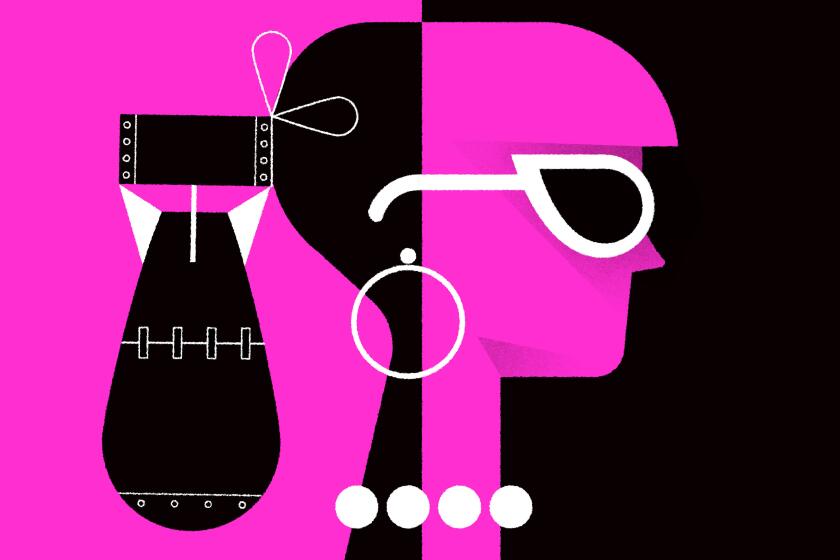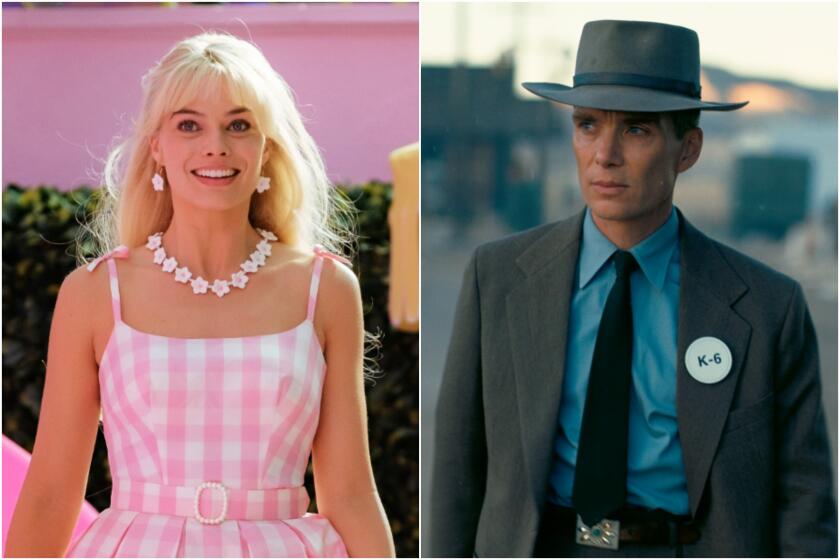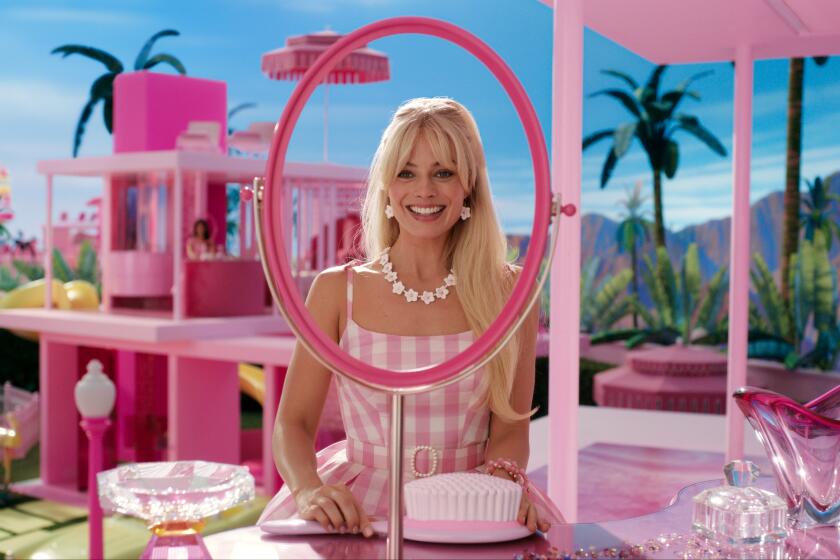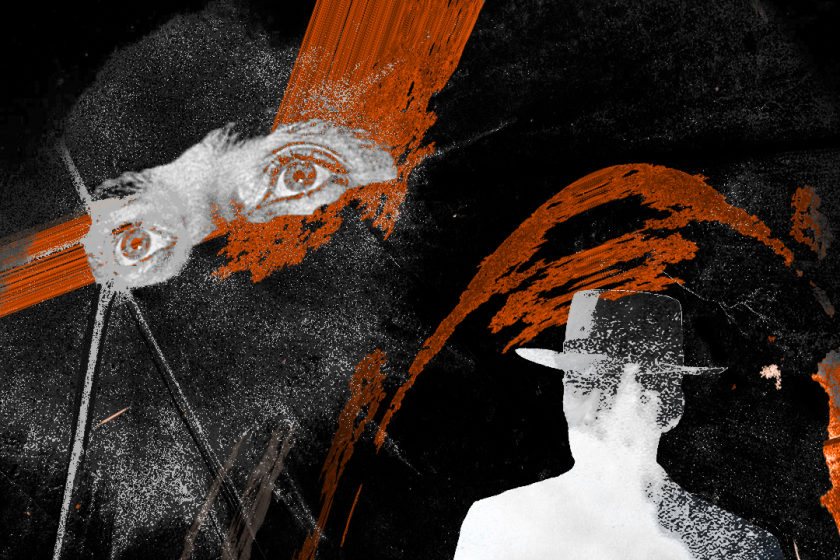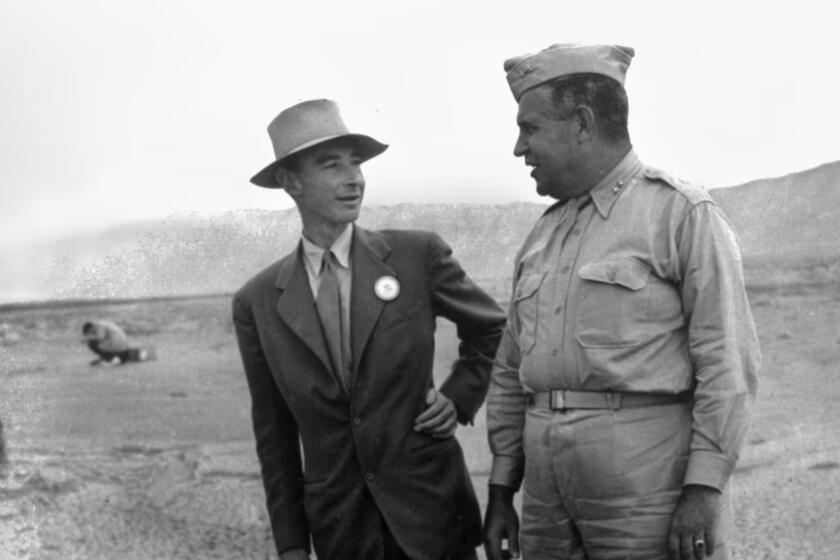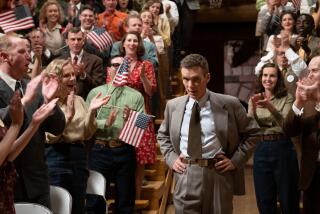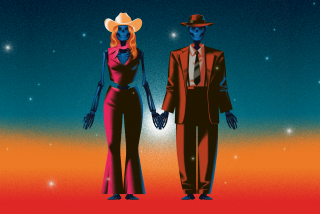Warner Bros. is sorry for supporting ‘insensitive’ ‘Barbenheimer’ memes as #NoBarbenheimer trends in Japan
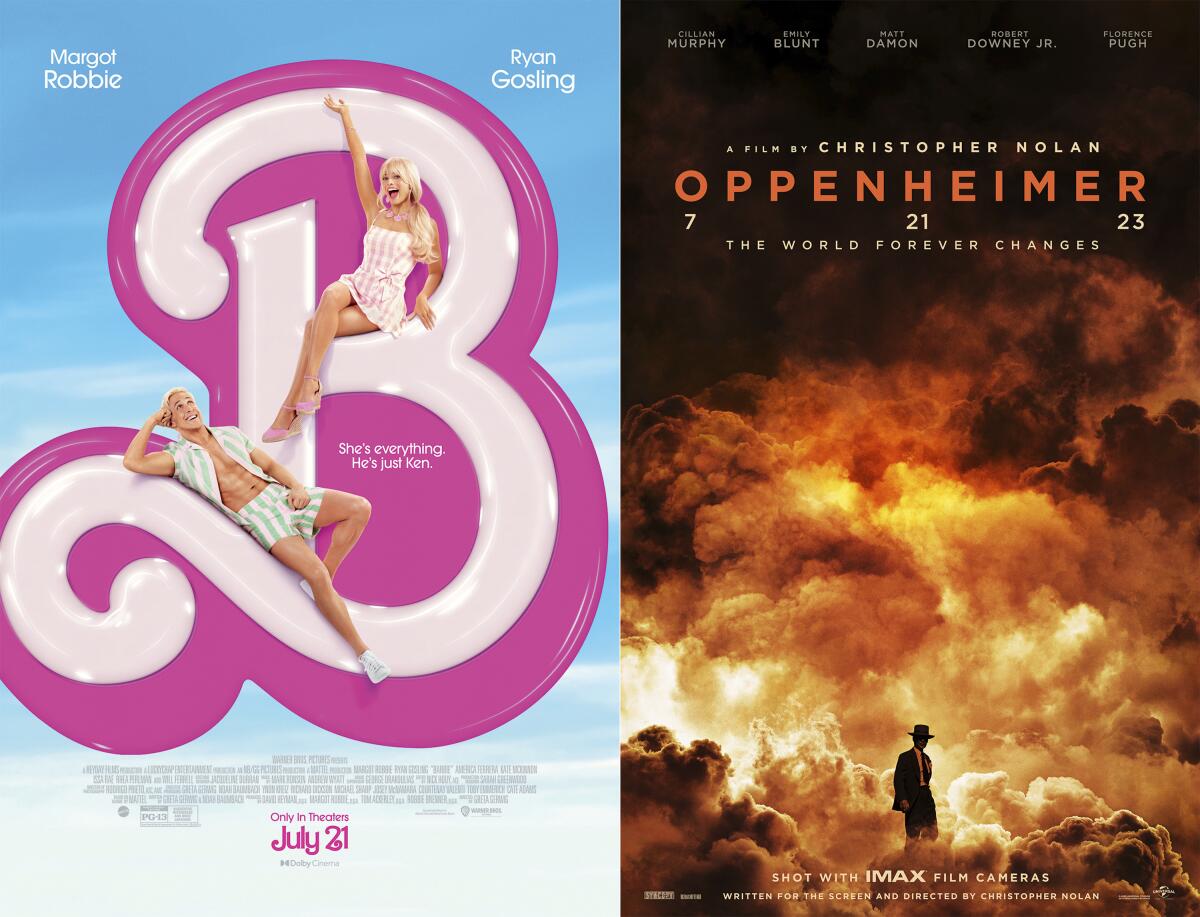
- Share via
The same memes that gave this summer’s blockbuster “Barbenheimer” event an aesthetic have become the subject of controversy in recent days as relatives of survivors of the real-life U.S. atomic bombings in Japan have said the mashups make light of the attacks.
For months leading up to the dueling summer releases of “Barbie” and “Oppenheimer,” fan-made memes combining pink, cheery doll-like smiles and atomic explosions have fueled the “Barbenheimer” craze.
The result: a historic box-office run as both films dominated ticket sales for two straight weekends and a pop culture phenomenon with viewers flocking to both films while dressed in hot pink. But as dust settles around the theatrical rush, the phenomenon finally may have reached its limit.
In Japan — where the U.S. dropped atomic bombs on Hiroshima and Nagasaki during World War II — #NoBarbenheimer has been trending as some have criticized the mashup memes for making light of the 1945 attacks. And Warner Bros. in the U.S. has since apologized for boosting those “Barbenheimer” memes after its Japanese counterpart criticized the social media behavior.
I saw Greta Gerwig’s ‘Barbie’ and Christopher Nolan’s ‘Oppenheimer’ back-to-back and lived to tell the tale.
Now, as the families of Japanese survivors are getting a platform online to discuss their loved ones’ real-life trauma, many are beginning to wonder whether the memes may have taken things too far.
Here’s how fans breathed Barbenheimer into existence, with a theatrical-release buildup so highly anticipated that even the studios began to participate in the hype, and the criticism that followed.
The ‘Barbenheimer’ craze
As early as January 2022, the first known “Barbenheimer” posts began to populate online. It started as a joke about an apparent Hollywood arms race as actors were being cast in Universal’s “Oppenheimer” and Warner Bros’ “Barbie” at a rapid pace, according to Know Your Meme. Soon after, the @FilmUpdates account on what was then called Twitter announced that both films would drop on the same day in 2023. Fans began to drop mentions of “Barbenheimer” in responses.
By December, one fan had begun to count down to the release date. The phrase carried into 2023 as some began to plan for double features.
Warner Bros.’ ‘Barbie’ and Universal Pictures’ ‘Oppenheimer’ both opened in theaters this weekend. Which movie ruled the domestic box office?
Soon after, fans seized on the inherent humor of the stark aesthetic contrast: a hot-pink tale about Mattel dolls versus a dramatic retelling of American physicist J. Robert Oppenheimer’s development of the atomic bomb — and memes combining promotional images of both movies exploded online.
The online craze led to real-life results last month as both films combined for the the highest-grossing weekend since the beginning of COVID-19 pandemic closures in early 2020 and the fourth-highest grossing weekend ever at the U.S. domestic box office. Also aided by a creative and seemingly omnipresent marketing campaign, Greta Gerwig’s “Barbie” notched the best domestic debut of all time for a title directed by a woman.
Fans dressing as Barbie or Ken filed into theaters, making an event out of moviegoing, a rare happening amid theaters’ post-pandemic decline. Even U.K. Prime Minister Rishi Sunak and his family saw both films, choosing “‘Barbie’ first.” The releases provided a much-needed boost to the in-person viewing industry. Film directing great Francis Ford Coppola declared both pictures “a victory for Cinema.”
Warner Bros. joins the ‘fun’
Though Barbenheimer and its spawned memes were fan-made and fan-led, during the week of the July release, Warner Bros. decided to officially enter the discourse.
Beneath a tweet of Barbenheimer fan art — showing Margot Robbie’s Barbie sitting on the shoulder of Cillian Murphy’s Oppenheimer as an atomic bomb explodes among palm trees behind them — Warner Bros.’ official Barbie account left a reply with a heart and kissing-face emoji, “It’s going to be a summer to remember.” The tweet has since been deleted, but it is archived online.
The much-memed, long-awaited feature from director Greta Gerwig is a delightful comic fantasy that promotes and deconstructs its own Mattel doll brand.
The following day, July 21, film critic Scott Mantz tweeted that he had seen both movies and suggested that viewers watch “Barbie” first. The tweet included another Barbenheimer meme with Robbie’s Barbie and Ryan Gosling’s Ken riding together in a pink convertible and an atomic bomb exploding in the background. The Barbie account chimed in: “We’re always thinking PINK.”
Furthermore, responding to another meme showing Robbie’s hair replaced with an apparent mushroom cloud, the Barbie account commented, “This Ken is a stylist,” referring to Barbie’s boyfriend.
Then on Monday, Warner Bros. Japan issued an apology on the Japanese-language Barbie account and criticized its American counterparts, writing: “We find the reaction to this fan-driven movement from the official US account for the movie Barbie to be extremely regrettable.
“We take this very seriously and are asking the U.S. head office to take appropriate action,” according to a translation by the Guardian. “We apologize to those offended by these inconsiderate actions.”
Warner Bros. issued its own apology later on Monday, saying that it “regrets its recent insensitive social media engagement. The studio offers a sincere apology.”
Families of survivors speak out
As the online drama between the two Warner Bros. divisions played out online, family members of survivors of the Hiroshima and Nagasaki bombings also began to speak out against the memes. Accompanying the #NoBarbenheimer hashtag, survivors’ families shared how the nuclear fallout had shaped their lives. Historians estimate that between 129,000 and 226,000 people, the majority of them civilians, died in the bombings.
The people of New Mexico were the first victims of the atomic bomb, the result of the Manhattan Project’s Trinity Test on July 16, 1945.
Twitter user @foggy_brisbane, who said their father had survived the bombing of Nagasaki, shared that they “still suffer from various illnesses” and asked to “not hurt us thoughtlessly.” Another relative of survivors said they have “corrupted organs and mangled DNA” and ultimately decided “not to have children, because of the atomic bomb.”
Responding directly to the Warner Bros. “summer to remember” tweet, @yuzuyuzukkss wrote that their grandfather’s entire family was killed in the bombings and added, “I can’t forgive people who laugh at the atomic bomb as a joke.” Additionally, @P_p0q, who said their grandmother survived the bomb, echoed the sentiment and asked, “Shouldn’t their suffering and history be more respected than the movie box office?”
To underscore their point, some users evoked the Sept. 11 terrorist attacks, creating their own Barbie-themed memes with images of the World Trade Center on fire.
Jeffrey J. Hall, a lecturer at Kanda University of International Studies in Chiba, Japan, called the #NoBarbenheimer controversy “a reminder of the perception gap between Japan and the U.S. over the issue of nuclear weapons.”
‘Oppenheimer’ is right about some aspects of the Manhattan Project, wrong about others, and skates over aspects that you might find interesting. Here’s a rundown.
“Japanese grow up learning about the horrors of the a-bombs and every year’s memorial ceremonies are treated as national news,” Hall tweeted alongside footage of Japanese people mourning the losses at memorials and ceremonies.
Christopher Nolan’s “Oppenheimer” itself has drawn backlash from viewers over its omission of the actual groups affected by both the atomic bombs and their testing.
The film never shows images of the destruction of Nagasaki and Hiroshima, nor its inhabitants. A brief scene shows Oppenheimer’s face reacting to images and descriptions of the carnage, which are not shown onscreen.
And while the movie portrays the Manhattan Project’s Trinity testing site in south-central New Mexico as remote, the land was inhabited by Hispanic and Native American ranchers and homesteaders. Their descendants, known as “downwinders,” have also spoken out against the film. Many have lost family members to cancer, which they attribute to exposure to nuclear waste from testing.
“There are some glaring omissions,” Tina Cordova, founder of the Tularosa Basin Downwinders Consortium, who also lost relatives to cancer, previously told The Times. “There was a level of racism, obviously [to the Manhattan Project]. They so easily invaded our lands, our lives and destroyed them both.”
Times staff writer Christi Carras and the Associated Press contributed to this report.
More to Read
Only good movies
Get the Indie Focus newsletter, Mark Olsen's weekly guide to the world of cinema.
You may occasionally receive promotional content from the Los Angeles Times.
